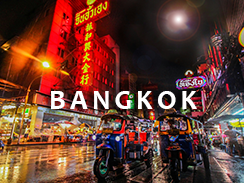How Technology Is Shaping the Way We Travel
Technology is undergoing a transformation in the travel industry, bringing new trends that are changing how people holiday. According to Edward Frost, British Airways' commercial manager for South and East Africa, technology today is influencing where we go, what we do, and the overall travel experience—similar to how the Boeing 747 revolutionized air travel in the 1970s. Now, technology is steering a second revolution in the travel landscape.
British Airways has identified four key technology-driven trends shaping modern travel:
1. Always-On
The constant connectivity of the digital age means many travelers opt for destinations that can help them disconnect, while others seek holidays designed for mental and physical well-being, such as spa retreats, yoga, and cycling trips. The "bleisure" trend—blending business trips with leisure—is also gaining momentum.
2. Enhanced Experience
With the rise of digital profiles, travelers now experience more personalized and intuitive customer service. Airlines, hotels, and even restaurants use technology to anticipate needs and provide a higher level of service. Unlike previous generations, who returned to the same destinations for the familiar, today's travelers expect a seamless and customized experience.
3. Constant Evolution
Innovative disruptors like Uber and Airbnb have redefined the travel market by offering greater flexibility and better prices. However, these disruptors are now facing competition from second-generation innovators aiming to improve upon or undercut these services. This ongoing evolution is forcing traditional businesses to adapt and stay relevant.
4. Less Sightseeing, More Experience
With the world shrinking through the internet, millennials are shifting away from traditional sightseeing holidays toward experiential travel. They now seek deeper connections with places, often engaging in community volunteer work or conservation projects, immersing themselves in the culture and local issues.
Edward Frost also notes the impact of technology on consumer behavior. For example, ba.com, launched 20 years ago with only basic information, now facilitates a 300% increase in online flight bookings. Nearly 60% of customers now check in through mobile or desktop, a testament to how digital tools are shaping how we book and experience travel.
In summary, technology is reshaping the travel industry by offering more personalized services, fostering flexible, immersive travel experiences, and continually evolving the way travelers make decisions and enjoy their holidays.












